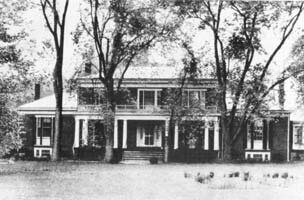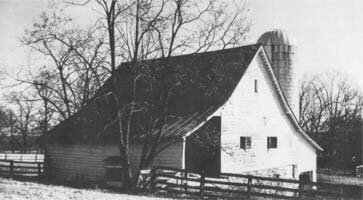>> Back to The HooK front page
COVER- Dodgeball: A true (real estate) story: and a tax break for the rich and famous
COVER- Dodgeball: A true (real estate) story
Published November 4, 2004, in issue 0344 of The Hook

BY LISA PROVENCE
Nearly four years ago, when former Tyco CFO Mark Swartz paid $17 million for historic Enniscorthy, the most expensive real estate purchase in Albemarle County history, he took advantage of a tax break that kept both the price and his identity secret-- and saved a couple of rich guys close to $50,000 in recordation taxes.
This year, Monticello used the same exemption in its $15 million purchase of Brown's Mountain, avoiding nearly $43,000 in fees to record the transfer.
When a house in Farmington, listed for $6.5 million, sold in June, neither the state nor county collected the $19,000 that the deal might have brought in transaction taxes.
Meanwhile, Lindy Auberry scraped together enough to make a down-payment on a $135,000 townhouse in RiverRun last year-- and she had to cough up nearly $300 to record the sale, and even to record her mortgage.
Welcome to the world of limited liability corporations, where Virginia code forces citizens to pay hundreds or thousands in recordation taxes-- while the rich and/or savvy can hide the purchase price, shield their identity-- and pay zero transfer tax.
Swartz's and Pickett's charge
Eleven years ago, John O. Pickett Jr., former owner of the New York Islanders ice hockey team, and his wife, Robin, set county preservationists buzzing when they tore down an 1815 barn-- Albemarle's oldest-- on Enniscorthy, a Keene-area property that was registered as both a state and national historic landmark.
(And in an odd chain of teardowns, the Palm Beach-based Pickett unleashed more tongue wagging last year when he sold his Four Winds estate in that ocean-front community for $20.5 million to billionaire/George W. Bush buddy Steve Schwarzman, who promptly razed that historic mansion.)
But it was the Pickett couple's sale of Enniscorthy three years ago that really inflamed Albemarle real estate watchers. Word was they'd sold the spread for a whopping $17 million.
When local fact-checkers raced to the courthouse to find out exactly who paid how much for the deluxe property, however, they were disappointed to find the Enniscorthy buyer listed as "Sea Ridge LLC." No sales price was listed; no recordation tax was paid.
"That's ridiculous," says Charlottesville resident Rob Hull, who was shocked to learn that he paid more recordation tax when buying his $62,000 townhouse in the Woolen Mills neighborhood five years ago than Swartz paid for buying the 1,400-acre Enniscorthy.
"It sounds like he's getting a handout," says Hull. "When you're not paying a tax in the community you're moving to, you're taking money away from children there."
Yet the dodge is all perfectly legal, says Albemarle County Clerk Shelby Marshall. Thanks to state code section 58.1-811, as long as the buyer and seller both have an interest in the LLC at the time of the transaction, the deal can escape transfer taxes.
Such deals, however, have come under fire in other states. In January, the speaker of the Maryland House of the Delegates introduced a bill to undo the loophole. Speaker Michael E. Busch said-- before the initiative was buried in a Senate committee in April-- that his measure would close a loophole used by "shell companies."
Merriam-Webster defines a shell company as one "that exists without assets or independent operations as a legal entity through which another company or corporation can conduct various dealings."
What does Swartz's Sea Ridge LLC do? Calls to his real estate lawyer went unreturned.
It wasn't until a year after his big buy that Swartz was publicly identified as the Enniscorthy owner when the sumptuous estate was opened for tours during Historic Garden Week in 2002.
That same year, another historic event occurred. Swartz, the chief financial officer of Tyco, was indicted along with company CEO Dennis Kozlowski for allegedly stealing $170 million. Federal prosecutors say the duo engaged in widespread "enterprise corruption" that bilked the company out of a total of $600 million.
Their first trial ended in April in a mistrial; they'll go back to court in January '05. Meanwhile, the former Tyco execs are suing Twin City Fire Insurance to pay more than $25 million in legal fees.
While Kozlowski's charges included shipping empty boxes to Tyco headquarters to avoid paying sales taxes on six paintings worth $13.2 million, no one's claiming that Swartz's dodge of Virginia and Albemarle recordation fees was illegal. Still, the U.S. government has frozen Swartz's assets, including Enniscorthy, until after the trial.
WWJD?
Monticello chief Dan Jordan has long coveted Brown's Mountain, aka Mountain Top Farm. When the 330-acre property became available earlier this year, the Thomas Jefferson Foundation leapt to buy it to protect Monticello's viewshed and restore it as "Montalto," another piece of Thomas Jefferson's extensive original land holdings.
The Montalto transaction recorded in the Albemarle County clerk's office didn't make it immediately apparent that, at $15 million, this was the second-priciest real estate deal in county history. One reason: The sale was reported as a gift. What's that about?
"I don't understand how these things work," pleads Jordan. "I'm a mere academic." He refers a reporter's call to Chris Piorkowski, Monticello's chief financial officer.
"No, it was not a gift," says Piorkowski, who jokes, "It was a $15 million gift."
The buyer set up a limited liability company, TJF Realty LLC. "There were still tenants there, and we were still doing environmental studies," she explains. "We didn't want the rest of the foundation's assets exposed to liability."
Another bonus, of course, is the avoidance of the recordation tax. And in the Montalto sale, the LLC ended up saving the buyer and seller a pretty hefty sum: $43,000.
The LLC exemption strikes again.
"As a foundation," says Piorkowski, "we have a fiduciary obligation to reduce liability and expense."
Here's how the exemption works. John Haskell, trustee for the seller, a Richmond woman, transferred the property as a gift to TJF Realty LLC in exchange for 100 percent ownership of the LLC. (This is important, because to get the exemption the seller has to have at least a 50 percent interest in the LLC and in the profits of the sale.)
The Thomas Jefferson Foundation then purchased Haskell's ownership-- what's legally called the "membership interest" in the LLC-- for $15 million.
"When you buy a membership interest, you're not buying a specific asset," says Piorkowski. "We're not saying, 'We're buying Montalto.' We're buying a membership interest in the limited liability company, TJF Realty."
And thus the sale is not recorded as a real estate transfer.
"It's a legitimate, legal, and often-used transaction," says Piorkowski.
And indeed, it's the same legal switcheroo Pickett and Swartz used to transfer Enniscorthy.
So did financier Randl Shure. In June, the board member of the UVA Health Services Foundation and founder of CapVest Ltd. sold his Farmington property to Dogwood Lane Properties LLC. Shure did not respond to a request for an interview, and his real estate agent declined to identify the buyer. However, the property had been listed for $6.5 million.
Two things about hiding sales prices trouble the county official who determines Albemarle County property values.
"For one thing," says assessor Bruce Woodzell, "with no sales price recorded, no tax is being paid on these sales." Even in the days before the September 2004 tax spike, the Montalto sale would have yielded $7,000 for Albemarle, with the balance of $36,000 going into state coffers.
Not only do the governments lose the money, but Woodzell loses information-- because no price is recorded in the clerk's office.
"I create an assessment based on market value," says Woodzell. "These transactions have no market value."
In these cases, when an assessment is made, it's likely to be underassessed. That means the multi-million dollar properties are undertaxed while the rest of the citizenry pays on full market value.
"I'm not saying these aren't legitimate," stresses Woodzell. "If this statute is in the state code, then they have the right to use it."
WWJD-- what would Jefferson do? Monticello's Piorkowski says she doesn't know, but then points to another tax break example. "If you own a house, you get to take a mortgage deduction on the interest. Are you skirting taxes by taking that deduction?"
Generous General Assembly
When the General Assembly amended the Code of Virginia in 1992 to allow these LLC recordation tax exemptions, was the purpose to help rich buyers avoid fees in high-dollar property transfers?
"No, no," says former delegate Alan Diamonstein, who brought the bill to the General Assembly. "I'm too good a Democrat for that.
"I can tell you right now there was no attempt to avoid recordation taxes," says Diamonstein, a Newport News attorney. "If you own property and want to transfer it to an LLC you own, it avoids duplicate taxes because you've already paid the recordation fees."
"I don't know all the rules on LLCs," said Governor Mark Warner when he visited Charlottesville in May after passing his budget. But as far as rich guys getting a tax break on million-dollar properties, "That doesn't sound fair," the governor said. "It sounds to me like a corporate loophole that needs to be looked at."
"The law's got to apply to everybody the same whether they're rich or poor," reminds State Senator Creigh Deeds.
Indeed, the same argument is made with Use Value Taxation-- land use-- that gives a tax break to owners of acreage who keep land for agricultural use instead of turning it into subdivisions, a break designed to help struggling farmers, but which also benefits rich "farmette" owners who put a handful of cows on the back 40. [See the Hook's April 10, 2003, cover story, "Land use: Farmers' friend or tax break for the rich?"]
The Hook reached real estate attorney Bill Tucker on a day when he had just finished using the exemption for a client who wanted to transfer some real estate to his LLC. Tucker compares the situation to a married couple who can transfer title to each other without having to pay recordation taxes.
"I think they made [the law] thinking it would be the same entity in the transfer," says Tucker, "but some smart lawyers have found a way to get around the tax."
Using an LLC isn't for everyone. Creating one entails paying the State Corporation Commission $100-- and a visit to a lawyer, which Tucker estimates should cost between $500 and $750. Still, it might be tempting.
As part of the General Assembly's 2004 budget bill, on September 1, the state recordation tax jumped from 15 cents to 25 cents per $100 of value. On that date, the Charlottesville and Albemarle County recordation fees bumped from 5 cents to 8.3 cents.
On a $200,000 home, the buyer pays $667, the seller pays $200, and if the buyer gets a $150,000 mortgage, it costs another $500 to record the deed of trust.
"So the total is $1,367 on a $200,000 sale," says Tucker. "It used to be $700 before September 1."
Tucker notes another potential for LLC abuse. "If I'm the clerk," says Tucker, "and someone presents me with this instrument, I have no way of knowing if this person owns an LLC." So someone could pretend to have an LLC to avoid recording fees.
"How are we supposed to know?" says Albemarle Clerk Shelby Marshall. "When we record these instruments, it's up to whoever prepares them to put in whether the property is exempt."
"Nothing we did was illegal or immoral," declares Monticello's Piorkowski. "We are using legitimate, legal options that further the Foundation's mission: the preservation of Monticello and its environs, and education."
And indeed, no one argues that Monticello shouldn't get the same tax break the Commonwealth allows colleges, churches-- or even the United Daughters of the Confederacy.
"We feel like we're contributing to the community and preserving the view," says Piorkowski. "It's a gift to the community not to have the whole thing developed."
However, the use of the exemption by rich individuals has Mike Thompson at the Thomas Jefferson Institute for Public Policy, a Northern Virginia-based think tank, wondering how many times it's been used in the 12 years since the General Assembly approved it-- and how much it's cost.
"What could the state have done with those additional taxes that could go to schools or roads?" asks Thompson. "That doesn't seem right. It doesn't sound like something I could get a way with."
RiverRun resident Lindy Auberry thinks this is an example of why the tax system needs a widespread overhaul. "There's a lot of unfairness in the tax code that average people don't know about," she says. "They may say it's only a couple hundred dollars on these fees, but for me, that's a lot. And Mark Swartz got away with saving $50,000 that he probably wouldn't even notice."
Advises Auberry, "They should tie up that loophole. It's ridiculous what rich people can get away with."
When Maryland's House Speaker tried to undo that state's law earlier this year, his bill would have put all the proceeds-- estimated at $45 million-- into school construction and renovation. However, some legislators feared they'd look less competitive than neighboring Virginia.
The Hook was unable to find any estimate on how much Virginia is losing when shell companies-- from strip malls and office parks to sumptuous estates and historic mountains-- change hands without paying transfer taxes.
Thompson thinks the Virginia law may have been written too broadly. "A typical guy sees this as another example of a law being used by those who are able to get away with it," he says, adding that the General Assembly may want to take another look.
If the exemption is in fact a loophole for the rich, agrees retired legislator Diamonstein, "then the legislature ought to close it."

Still holding the record for Albemarle's largest real estate sale, historic Enniscorthy lost its state and national historic landmark status during John Pickett's ownership.
PHOTO COURTESY EDWARD LAY

The oldest barn in the county-- before it was torn down by a former Enniscorthy owner.
PHOTO COURTESY EDWARD LAY

Real estate attorney Bill Tucker uses the LLC exemption for clients who've already paid the recordation taxes on their property.
PHOTO BY JEN FARIELLO
#
>> Back to The HooK front page
|